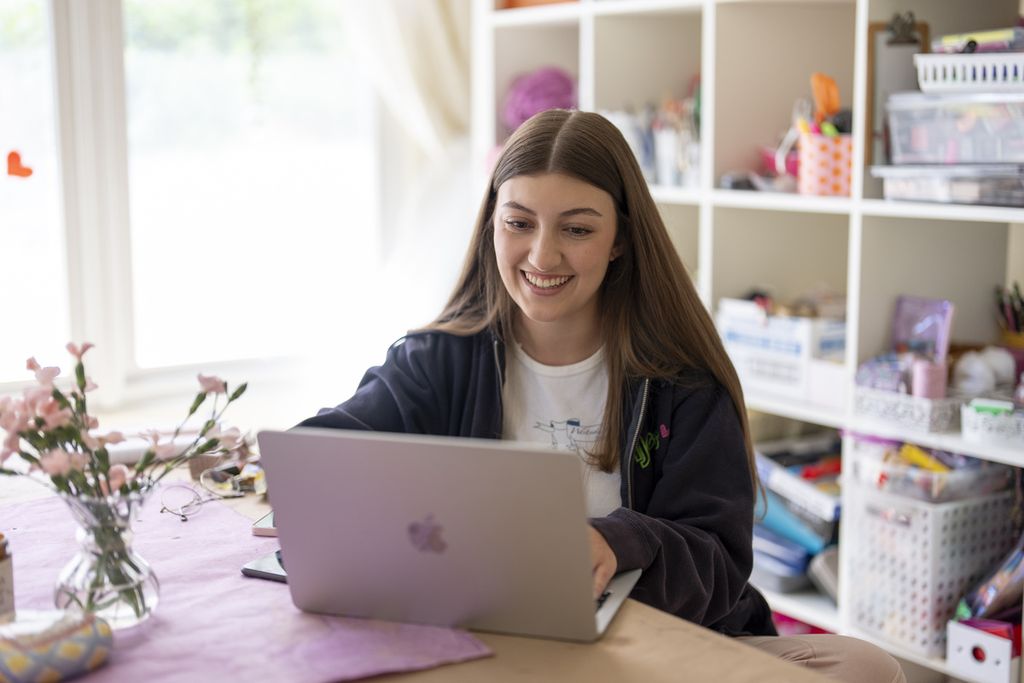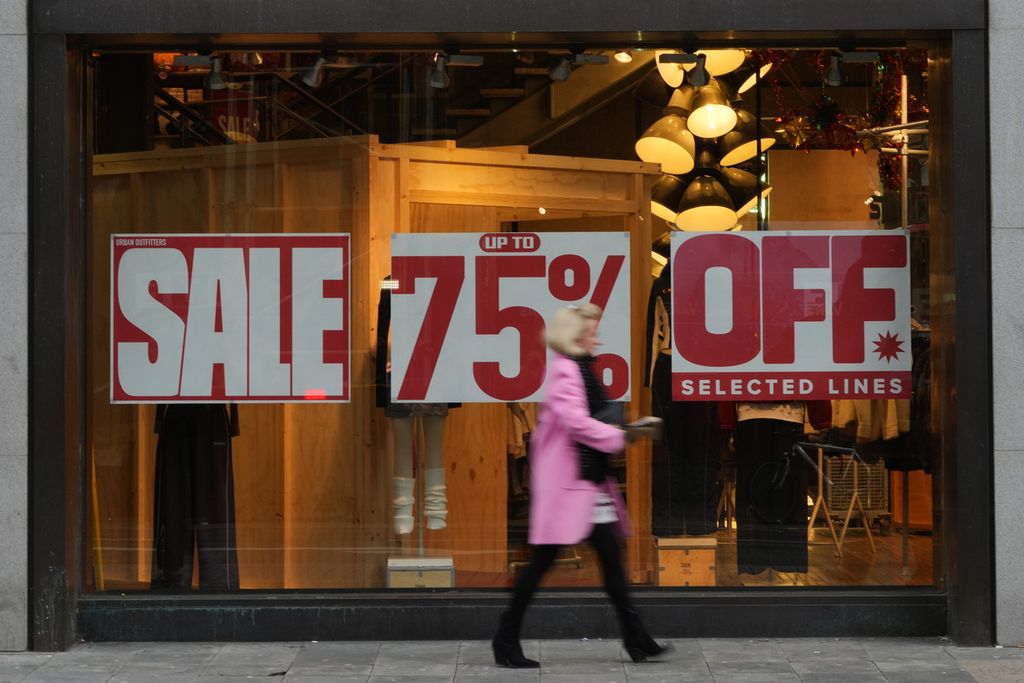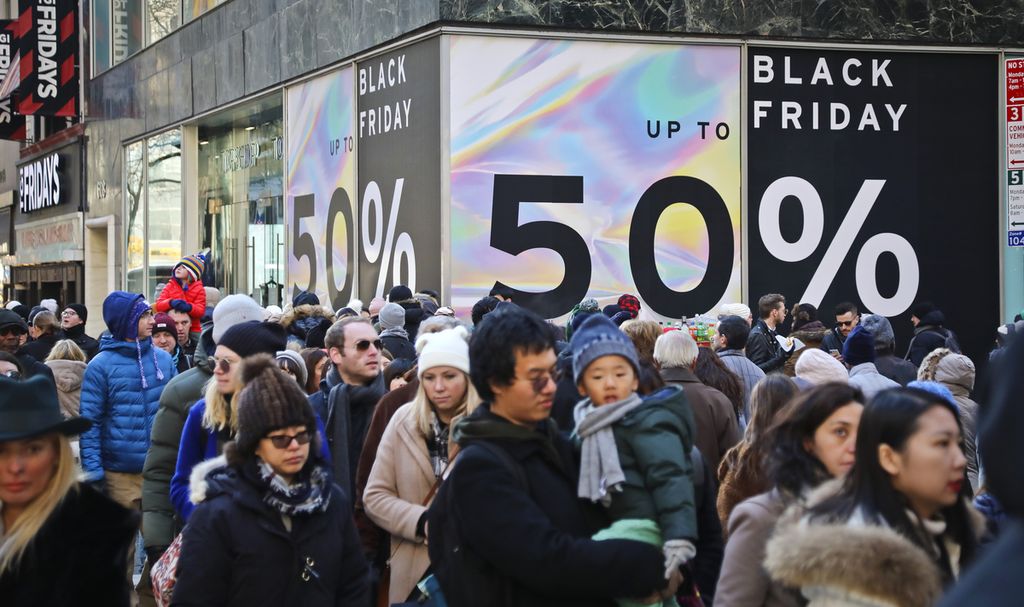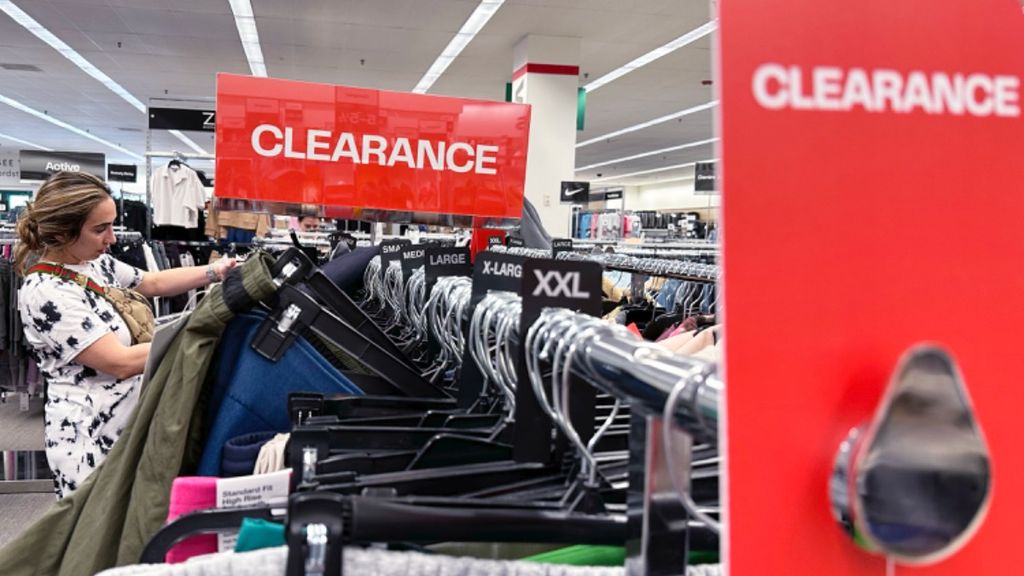Reported by the Associated Press news agency on Wednesday (29/5/2024), Berman, who works as a creative director in a company, chose to live frugally in order to pay off all of his credit card debts. If he manages to get through this, he hopes to be able to live a frugal life or one that reflects his overall abilities.
Also read: Young people are stuck living from month to month
However, this frugal living process turned out to be more difficult than Berman expected. Just two weeks into living frugally, he couldn’t stop himself from buying a beret. He also couldn’t resist buying a pair of the latest collection of boots.
Visa credit cards in New Orleans, US on August 11, 2019. Consumers in the US are increasingly struggling to pay their credit card bills.
Although the “challenge” of frugal living has helped Berman reduce his expenses, he still cannot save much. “If I can live frugally and save, my ability to pay off debts can also be better,” said Berman.
For most people, it is not easy to talk about their personal financial difficulties. However, Berman is willing to share his experience. He discussed his financial struggles with his friends and family and then posted about this issue on social media.
Berman has about 60,000 followers on the Tiktok social media platform. Berman’s video showing an empty bottle of skin and hair care product has been viewed more than 1 million times.
If I can live frugally and save, my ability to pay debts will also be better.
Not only Berman shared experiences like this. A 22-year-old young man in San Diego went as far as to swear not to go near Target stores. There is also a 26-year-old young man in the UK who no longer wants to buy carbonated drinks.
Berman and the two other young people did not know each other. However, they both try to spend money only to buy things that are really needed. What they are doing is becoming a trend called no-buy year or the challenge of not shopping for a year.

A shopper carries shopping bags while walking through The Village on May 30, 2024 in Corte Madera, California, USA.
The rules of this challenge are simple. Anyone who participates must pledge to stop buying unnecessary items, such as shoes, additional beauty products, or other impulsive purchases. The challenge is for a specified period, usually for a year.
Also read: Frugal Living for the Future: Economical or Stingy?
The no-buy year trend started several years ago. Initially, this was just an experiment in a blog about budgeting and spending awareness. This trend then became popular on TikTok and Reddit groups where people share their experiences. On Reddit, there are up to 51,000 members.
Although it started a few years ago, the trend of shopping fasting remains relevant until now, especially after the Covid-19 pandemic. Consumer financial advocate for private financial company Credit Karma, Courtney Alev, said that the beginning of 2024 will be an opportunity for the public to reorganize their finances after living on a shoestring due to the pandemic. “Many are trying to recover their financial situation by saving money,” she said.
Impulse shopping
Not everyone who follows the fasting shopping trend has debt. Amea Wadsworth, who returned to San Diego, California, after graduating from college, wants to live frugally to save the environment and money for her future.

Amea Wadsworth works on a computer at her home on April 19, 2024, in San Diego, USA.
After returning to live with his mother, Wadsworth began to notice how many of his belongings were taking up space. He became more aware of his personal contribution to the world’s waste heap after working for a sustainability app-making company. “I keep track of all my expenses and what I buy,” he said.
After realizing the abundance of items that are actually not very important to buy, she began to improve herself. Every time she wants to buy something, she writes it down first to consider whether the item is really necessary or just a mere impulse. After writing it down, usually she ends up not buying the item.
“When looking at all the items in my house, I found many things that I bought but never used again. Yet, I’ve already spent a lot of money,” said Wadsworth.
/https%3A%2F%2Fasset.kgnewsroom.com%2Fphoto%2Fpre%2F2022%2F01%2F22%2F35570b9b-480e-4cde-a40e-4d1b8af396a0_jpeg.jpg)
A row of facial skin care products at a supermarket in Jakarta, Tuesday (18/1/2022).
Mia Westrap, a PhD student from Southampton, England, also utilized Tiktok as a way to maintain accountability while taking on the challenge of fasting on shopping. She decided to join this movement because she lives like an astronaut, from month to month.
Faced with this challenge, Westrap hopes to save more money to pay for his lease. If Berman’s weakness is in clothes, Westrap’s weakness is in food and drink. Just buying a carbonated drink can cost him thousands of US dollars.
Also read: Frugal Life, Antidote to Reckless Traditions
Just like Berman, Westrap also doesn’t want to hang out or go out to eat which often costs a lot of money. He even stopped going out for a while, at least for a year.
“I don’t want to date right now because I know there will be expenses for buying food or drinks. Usually, I pay for it myself. I don’t like being treated by others,” said Westrap.

A woman looks at fruit at a Whole Foods grocery store, on January 19, 2024, in New York, US.
Wadsworth is not as obsessed with material possessions as Berman and Westrap. While he does not want to buy anything, he still occasionally eats out with friends. He also visits his girlfriend who lives outside the city from time to time. For Wadsworth, finance is closely related to emotions. These emotions sometimes drive a person to want to buy something that is not actually needed.
When Wadsworth feels the urge to acquire something that he sees on social media or hears from others, he writes it down instead of immediately buying the item. At the end of the month, he reviews his list and decides what, if anything, is still worth purchasing.
Also read: Young Americans increasingly depend on their parents for living expenses
“I look back at how much I wrote and I feel, ‘I’m glad I didn’t buy it because I really didn’t need it,'” said Wadsworth.
If you often make impulsive purchases, it may be useful to write down the items you want to buy. Take the time to think more deeply about the usefulness of the item.
Think about it first
Like Wadsworth who wants to save the environment, Sabrina Pare (31), a resident of Detroit, Michigan, also reduces shopping solely because she loves an eco-friendly lifestyle. She started a shopping fast challenge by organizing her closet and becoming a minimalist. She avoids fast fashion trends.
Shopping less will save the planet. “The problem in our society now is excessive consumption,” he said.

A shopper passes a display window displaying a for sale sign on Oxford Street in London, US, on December 20, 2023.
One way to avoid excessive consumption is to be wise in using social media. Many people end up shopping or spending too much money due to influencer promotions on social media. For example, Breman stopped following fashion influencers so that he wouldn’t feel the urge to buy something.
Carrie Rattle, CEO of Behavioral Cents, a financial training company, explains that learning to avoid impulsive shopping must start with rethinking buying habits and being aware of the triggers. “Every time we shop, we will definitely get a little dopamine. You have to try to resist the need for dopamine. That’s the challenge,” she said. Dopamine is a chemical in the brain that affects emotions, feelings of pleasure, and even pain.
To be able to successfully avoid excessive spending, followers of the fasting shopping challenge learn new techniques. For example, Westrap always brings a book wherever they go so there is no excuse to buy more books.

A crowd of people walked past the large store sign displaying Black Friday discounts in the middle of Manhattan, USA on November 23, 2018.
Meanwhile, Pare stopped subscribing to newsletters that promote clothing and skin care products. Berman dyed her hair back to its natural brown color as coloring her hair at an expensive salon was costly. Typically, she would color her hair with bright blonde hue at the salon.
If the time spent in front of screens or social media exacerbates the habit of excessive shopping, we should take a break from the tempting social media accounts.
Also read: Being Frugal Without Miserable
After successfully reducing his credit card debt, Berman hopes to start saving and investing. Wadsworth plans to focus on spending his money to have more experiences with his loved ones, rather than on material possessions. Pare hopes to be able to pay off his student loans.
“After going through this challenge, eventually we will get used to thinking before buying something. Is it necessary or not? Or if we can buy a product that can be refilled, why buy a small packaged product. This may sound difficult. If this challenge sounds very scary, maybe that means you need it,” said Wadsworth. (AP)

